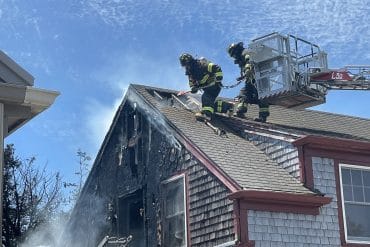Nantucket Police Chief Bill Pittman plans to seek funding to equip his officers with body cameras, the technology that has become a focal point in police reform initiatives across the country.
In the aftermath of George Floyd’s murder by police officer Derek Chauvin in Minnesota and numerous other cases in which video recordings of police interactions, or the lack thereof, have been pivotal, departments nationwide have been adopting body cameras as a tool to both hold officers accountable and protect them from false complaints.
Pittman said he plans to bring the body camera issue forward during the town’s next budget cycle, but is also awaiting critical guidance at the state level. The Massachusetts police reform bill signed into law in December calls for the creation of a task force to study body camera regulations. There’s the possibility, he said, that the state could mandate all departments to have body cameras and provide funding for them.
“I think that they (body cameras) are soon to be on every police officer after the commission issues its report and recommendation,” Pittman said.
In terms of adopting similar technology, the Nantucket Police Department is well ahead of other Massachusetts police agencies, having implemented dashboard cameras in all its cruisers 16 years ago. Among the state’s roughly 480 law enforcement agencies, WBUR recently reported, only a dozen have body cameras and even fewer have dashboard cameras. On Cape Cod, Yarmouth Police Chief Frank Frederickson has said implementing body cameras is a top priority for his department.
“One important, key fact that has to be understood in today’s environment is that our officers who are out there doing the jobs that they do are often videotaped, and only pieces of what they do are on record,” Frederickson told the Cape Cod Times. “We’re the last ones to have any type of evidence to support our officers’ actions or find out what actually took place from the officer’s point of view. Bodycams really go a long way to correcting that.”
Over the past eight years, Massachusetts has the second lowest rate of fatal police interactions in the country, according to data compiled by Mapping Police Violence. While there have been no such incidents on Nantucket in recent history, Pittman said his department’s dashboard camera footage is routinely requested for nearly every case that involves a traffic stop as part of the discovery process in court.
“We have had countless situations where either the video or audio from the dash cams or even the lobby video have protected the officers from frivolous complaints,” Pittman said. “People complain about an officer stopped them for no reason but the dash cam video clearly demonstrates that the officers stated reason was usually accurate.”
Beyond the expensive cost of implementing body cameras, which Pittman estimated to be $225,000 to get the program started on Nantucket, they come with additional financial and administrative burdens for police departments. There will be significant data storage needs and additional personnel necessary to manage it, as well as respond to requests for video footage relevant to arrests and court cases. That could mean an additional $100,000 each year in expenses associated with body cameras.
“Historically what departments that have cameras are finding is their public records costs go up significantly because everyone wants to see why the cops were at the neighbor’s house last night,” Pittman said. “Oftentimes requiring the hiring of a full-time employee to just deal with those. The rules have to be carefully crafted because cameras, while they do provide a higher level of protection for an officer against frivolous complaints, they also expose the general public to significant intrusions into their privacy.”







